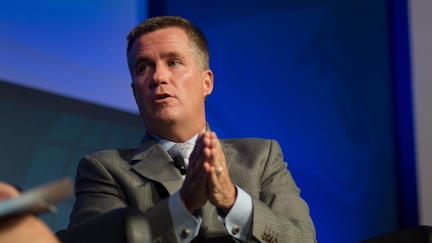Canadian Pacific Railways Ltd.’s Keith Creel for years followed in the footsteps of his mentor, Hunter Harrison, an industry legend whose revolutionary efficiency strategy became the standard at all the major North American railroads.

Now, the protege has a good shot at achieving a major merger—something that Harrison, who died in late 2017 at age 73 during a turnaround effort at CSX Corp., couldn’t after several failed tries.
“This is the only merger left that could potentially be a stabilizing one and not a destabilizing one,” said Tony Hatch, a rail industry consultant. “This is one that takes Kansas City Southern out of play and combines the two smallest railroads.”
The timing follows a global pandemic that made companies rethink the risk of having overseas supply lines. The supply chain was frozen by China’s initial lockdown last year to control the coronavirus, and the subsequent re-opening has created a maritime logjam at U.S. ports. A cloud over trade was lifted in July with a renegotiated trade pact among Canada, the U.S. and Mexico, while President Joe Biden is seen as less likely to issue trade threats by Twitter than predecessor Donald Trump.
“The stars have aligned to make this deal happen,” Creel, an Alabaman who followed Harrison to three companies, told analysts on a call Sunday.
The Next Spike
Railroads are central to the history of North America’s industrial development, and industry lore is almost always told from the East looking West: A “Golden Spike” united the first transcontinental railroad in the U.S. in 1869; the “Last Spike” did the same in Canada in 1885.
Some 150 years later, Creel is writing a North-South story.
The tie-up announced Sunday would create a 20,000-mile, T-shaped network, giving Canadian Pacific access to Kansas City Southern’s sprawling Midwestern rail systm that connects farms in Kansas and Missouri to ports along the Gulf of Mexico. The network would also let CP reach deep into Mexico, which made up almost half of Kansas City Southern’s revenue last year, and benefit from the 16 different automotive factories along its tracks there.
Under terms of the deal—the biggest Canadian purchase of a U.S. asset since 2016—Kansas City Southern investors will receive 0.489 of a CP share and $90 in cash for each share they hold, valuing the stock at $275 apiece. That’s 23% more than Friday’s record close, according to a statement from both companies on Sunday.
Creel will be CEO of the new company, to be based in Calgary, and plans to stay at the helm until at least early 2026. The new entity, to be called Canadian Pacific Kansas City, or CPKC, will have revenue of about $8.7 billion and almost 20,000 employees. Shareholders of CP will hold 75% of the combined company.
Regulatory Issues
The companies—whose boards unanimously approved the deal—say they are expecting to get final approval from regulators by mid-2022. In the U.S., it’s the Surface Transportation Board that will have the biggest say.
Rail combinations reached a fever pitch in the 1990s, with some causing such chaos that the STB raised the bar for approving deals in 2001. But one small railroad got an exemption from stricter rules—Kansas City Southern.
“We’ve got complete confidence in this deal and the review process,” regardless of which set of rules the STB applies, Creel said on Sunday. “We think that the facts are so compelling that when the STB rules and weighs the facts, they will come to the same conclusion.”
The two networks don’t overlap and won’t take away customers’ rail options, Creel said. The combination also will help reduce emissions by attracting freight from truck to rail, which is about four times more fuel efficient. Some 80% of the production from the Mexican auto plants along the network crosses the border north to the U.S. and Canada and can be hauled in one shot by the new entity, the companies said.
The tie-up would leave Canada with two railroads that have similar coast-to-coast networks that reach down to U.S. Gulf ports. The U.S. would have four railroads balanced almost equally between two larger ones in the West and two smaller ones in the East.
While it’s impossible to say never to further industry consolidation, it probably wouldn’t happen for a decade or more if it did, said Lee Klaskow, an analyst with Bloomberg Intelligence. That round of consolidation would be more complicated because companies would be jockeying not to miss out of the few deals left to be made. The Canadian Pacific offer to buy Kansas City Southern is much more straightforward, mostly because the two networks don’t duplicate track, Klaskow said.
“They interchange in one location,” Klaskow said. “It’s the easiest deal to get done.”
Mentor and Protege
But railroad deals aren’t always easy.
While Hunter Harrison was CEO of Canadian Pacific, he tried to buy CSX Corp. and Norfolk Southern. He declined to pursue a combination with Kansas City Southern at the time because of its large operations in Mexico. Harrison didn’t like the currency risk nor the lack of legal and regulatory transparency.
Creel is betting that Harrison was wrong.
“If anybody knows Hunter Harrison and has experience with him, it’s me,” Creel said in an interview. “He’s a human being. He didn’t get everything right.”
“I would just say that he wasn’t seeing these same compelling facts and this perfect time to combine these two companies, or I’m certain that he would align and agree with what we’re doing.”








